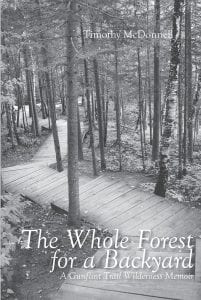Anyone who has ever wondered what it would be like to grow up in a Northwoods resort family now has a chance to find out. Timothy McDonnell, the third of Pat and Bette McDonnell’s six children, has written a memoir about growing up at Gateway Lodge called The Whole Forest for a Backyard: A Gunflint Trail Wilderness Memoir.
“All of my earliest recollections of joy had their origins here,” McDonnell writes. He moved with his family from suburban Chicago to the shore of Hungry Jack Lake in 1958 when he was 2 years old. He spent summers wearing sneakers and shorts, with nothing on top but what his dad called his “one-button shirt.”
McDonnell communicates subtly and poetically. “There was a time when my entire world was only 60 miles long,” he writes. “Through the heart of it ran a narrow ribbon of road called the Gunflint Trail. The trail starts in the village of Grand Marais, Minnesota, on the north shore of Lake Superior. It rises over a sawtooth ridgeline of granite before plunging deep into the boreal forest. About halfway along this wilderness road is the turnoff to Hungry Jack Lake.”
McDonnell said his mom grew disenchanted with big-city life and decided she wanted to raise “freerange children” in the woods. “Mom and Dad became captives enticed by the romance of this wild place when they signed the purchase agreement,” McDonnell writes. “It was all so fresh, so green, and so different from Chicago life. So strong was the pull that practicality took a back seat to dreaming.”
The main lodge building was at that time the longest full log structure in the state. It had running water and electricity but no toilets. “My parents were rich in outhouses and mighty grateful that at the time of purchase only one of their children was in diapers,” McDonnell writes.
“If I could go back in time and once again conduct a nickel tour of Gateway Lodge, I would include all of my favorite play haunts as well as the several working parts of my family’s business,” McDonnell writes. “There was much the typical guest never got to experience. For example, they missed out on the cool, dank, earthy smells of the root cellar. Here a little boy could pretend he was a caveman or a leprechaun. There might even be a pot of gold somewhere in one of the dark corners.”
McDonnell writes of catching dozens of bluegills from the dock with children of the lodge guests. “We always let the fish go and could not imagine anyone eating a bluegill. They were our buddies. Either these fish were in limitless numbers, or a small handful of bluegills had rubber lips and alarmingly poor memories. I was never certain which.”
McDonnell and his younger brother Chris often delivered mail to nearby summer residents. “Chris and I had a bit of a sly racket going with this delivery job,” he writes. “We knew full well that Ann Hanover and Ellen Zimmerman were both pushovers and would give us candy. We were shameless moochers. Little brother Tad was small and cute, and we soon discovered we took in a far better haul when we brought him along with us.”
Dealing with frozen pipes was one of the many challenges of wintertime at the lodge. McDonnell talks about his father’s valiant attempts to learn from locals what he needed to know to keep the water lines from freezing. “Information, though, is different from wisdom,” McDonnell writes. “Dad possessed more of an academic bend than any flare for the practical. His degree in philosophy from the University of Notre Dame counted for squat each time he ended up chopping a hole in the ice at the end of the boat dock to get drinking water for the family. … In retrospect, I have come to admire Dad’s stubborn persistence, for he learned most of what he ever was to know about wintering in the woods and becoming a local there through what must have been for him the most humbling means possible.” “We made the lodge a success by our putting to use the same tools that help make a family succeed,” McDonnell writes. “These are cooperation, creativity, patience, compromise, and at times, sacrifice.” Eventually, the children grew large enough to help with the business, Pat and Bette would run other businesses in Florida in the wintertime, Pat would become disabled from a brain aneurysm, and they would sell the lodge.
“I would once again like to hear the lodge bell ring, signaling lunchtime, and run home with my little brothers,” McDonnell writes. “Each of us is chewing on caramels, wearing a one-button shirt, and mighty proud of his root beer belly.”
McDonnell describes soaring on a sled down the hill to the lodge with Chris on a frigid January day. “We were hardy trappers, mountain men, intrepid mushers rushing the serum to Nome and destined to become heroes. We sneered at hardship, laughed in the face of death, and spat in the eye of every polar bear we encountered. Then we got cold.” When he returns for a visit now and covers that same stretch of road, McDonnell writes, “It is a short distance that reminds me of all we have gained and all we have lost in the past half-century. Sled run or no sled run, I find my eyes still water and blur from time to time these days.”
The Whole Forest for a Backyard: A Gunflint Trail Wilderness Memoir is published by North Star Press of St. Cloud. It is available through North Star Press, Amazon, Barnes and Noble, Partners Publishers Group, and Ingram. In Cook County, it is available at Birchbark Gifts, Drury Lane Books, Lake Superior Trading Post, Stone Harbor Wilderness Supply, Kah-Nee-Tah Gallery, Naniboujou Lodge, Nor’Wester Lodge, and Chik-Wauk Museum and Nature Center.



Loading Comments